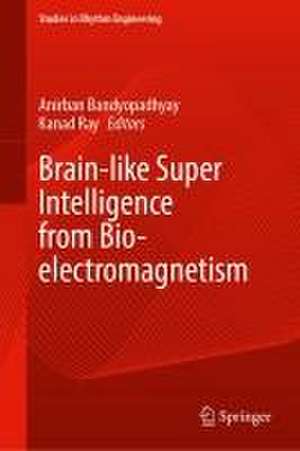Brain-like Super Intelligence from Bio-electromagnetism: Studies in Rhythm Engineering
Editat de Anirban Bandyopadhyay, Kanad Rayen Limba Engleză Hardback – 8 mar 2024
Preț: 1168.99 lei
Preț vechi: 1461.23 lei
-20% Nou
Puncte Express: 1753
Preț estimativ în valută:
223.71€ • 232.14$ • 186.98£
223.71€ • 232.14$ • 186.98£
Carte disponibilă
Livrare economică 24 februarie-10 martie
Preluare comenzi: 021 569.72.76
Specificații
ISBN-13: 9789819702312
ISBN-10: 9819702313
Pagini: 349
Ilustrații: XIV, 349 p. 172 illus., 92 illus. in color.
Dimensiuni: 155 x 235 mm
Greutate: 0.73 kg
Ediția:2024
Editura: Springer Nature Singapore
Colecția Springer
Seria Studies in Rhythm Engineering
Locul publicării:Singapore, Singapore
ISBN-10: 9819702313
Pagini: 349
Ilustrații: XIV, 349 p. 172 illus., 92 illus. in color.
Dimensiuni: 155 x 235 mm
Greutate: 0.73 kg
Ediția:2024
Editura: Springer Nature Singapore
Colecția Springer
Seria Studies in Rhythm Engineering
Locul publicării:Singapore, Singapore
Cuprins
Chapter 1: Exploring the Possibility of Non-local Communication in Human Beings: an Empirical Test of the Information Field Hypothesis.- Chapter 2: HI Applications for ADHD Children: The Graphic Design Perspective.- Chapter 3: Relationship between Intelligence and Universal Consciousness.- Chapter 4: A Genre of Cognitive Evolutions Through Artificial Superintelligence and Robotics Technology.- Chapter 5: Probing the electromagnetic interaction in the protein.- Chapter 6: Revisiting self-operating mathematical universe (SOMU) as a theory for Artificial General Intelligence, AGI and G+ consciousness.
Notă biografică
Dr. Anirban Bandyopadhyay is a principal research scientist at the National Institute for Materials Science (NIMS), Tsukuba, Japan. He completed his Ph.D. in Supramolecular Electronics at the Indian Association for the Cultivation of Science (IACS), Kolkata, in 2005. From 2005 to 2008, he was an independent researcher, as an ICYS research fellow at the International Center for Young Scientists (ICYS), NIMS, Japan, where he worked on the brain-like bio-processor building. In 2008, he joined as a permanent scientist at NIMS, working on the cavity resonator model of human brain and design synthesis of brain-like organic jelly. From 2013 to 2014, he was a visiting scientist at the Massachusetts Institute of Technology (MIT), USA. He has received several honors, such as the Hitachi Science and Technology Award 2010, Inamori Foundation Award 2011–2012, Kurata Foundation Award, Inamori Foundation Fellow (2011–), and Sewa Society international member, Japan.
Dr. Kanad Ray isa professor and head of the Department of Physics at the Amity School of Applied Sciences Physics at Amity University Rajasthan (AUR), Jaipur, India. He has obtained M.Sc. and Ph.D. degrees in Physics from Calcutta University and Jadavpur University, West Bengal, India. In an academic career spanning over 22 years, he has published and presented research papers in several national and international journals and conferences in India and abroad. He has authored a book on the electromagnetic field theory. Prof. Ray’s current research areas of interest include cognition, communication, electromagnetic field theory, antenna and wave propagation, microwave, computational biology, and applied physics. He has served as an editor of Springer Book Series such as AISC and LNEE and an associated editor of Journal of Integrative Neuroscience published by IOS Press, Netherlands.
Dr. Kanad Ray isa professor and head of the Department of Physics at the Amity School of Applied Sciences Physics at Amity University Rajasthan (AUR), Jaipur, India. He has obtained M.Sc. and Ph.D. degrees in Physics from Calcutta University and Jadavpur University, West Bengal, India. In an academic career spanning over 22 years, he has published and presented research papers in several national and international journals and conferences in India and abroad. He has authored a book on the electromagnetic field theory. Prof. Ray’s current research areas of interest include cognition, communication, electromagnetic field theory, antenna and wave propagation, microwave, computational biology, and applied physics. He has served as an editor of Springer Book Series such as AISC and LNEE and an associated editor of Journal of Integrative Neuroscience published by IOS Press, Netherlands.
Textul de pe ultima copertă
This book discusses various aspects of bioinspired technologies but with an additional emphasis on the medical science, starting from the popular article on neurobiology to pure biophysics that ends with the superintelligence of biological systems that could be reverse engineered. It covers eight different aspects of natural intelligence, starting from the fundamental electromagnetic properties of a protein to the vibrations and the resonance of the entire biomaterial system. It also covers a wide spectrum of hierarchical communication among different biological systems for intelligence and then medical science is applied.
Caracteristici
Covers a wide spectrum of hierarchical communication among different biological systems for intelligence Discusses various aspects of bioinspired technologies but with an additional emphasis on the medical science Helps students and scholars to learn basics of superintelligence and bioinformatics






